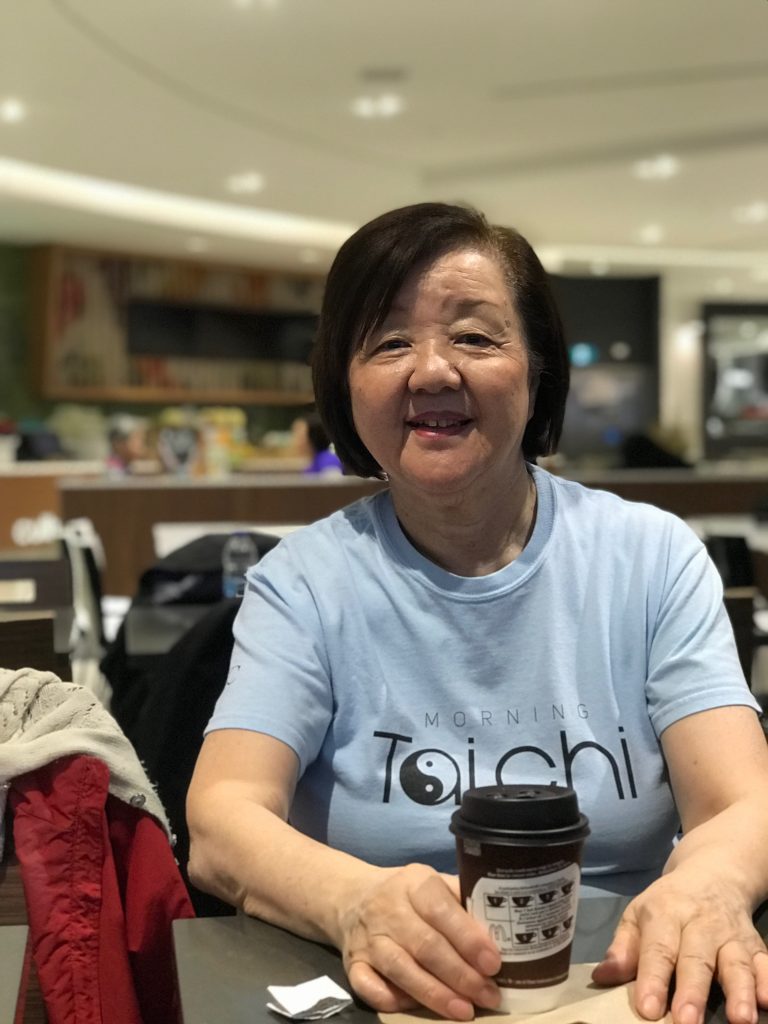By Sam Harley
At 7 a.m. the Scarborough Town Centre (STC) is a ghost town. The sun is up but even it is still tired. Though 7 a.m. is not terribly early, there is not a single person visible on either floor and the only sound emanating through the mall is soft music, similar to what plays at spas; a calm sounding instrumental music that immediately brings peace through the body. The music starts getting louder as you head down the escalator towards the food court. To the left, there is a group of seniors moving their bodies slowly through their small allocated area beside the food court. People are cutting into their eggs and bacon while others are listening to the soothing music, fully engaged in tai chi. The teacher, Peter Kwong, raises his right hand slowly in the air as if he’s reaching to pick an apple from a tree and the other members follow in a similar motion – then someone crunches down on their bok choy from Carribean Queen. The time is now 8 a.m., and though there are still two hours until mall opening, there are now far more people – more mall walkers, employees preparing for the day, and janitors. Kwong doesn’t let these growing distractions stop him from teaching his class. Despite the top 40 and dance music coming from the Zumiez store directly to the right of this class, the sizzling grills of the food court, the people talking – Kwong continues to ignore it all. The class of 25 continues to follow his every slow motion in perfect unison.
The food court, though the mall isn’t open, is busy during the early hours as there are many commuters getting coffee. Despite the crazy atmosphere, Kwong never loses focus, and the class of 20-30 elderly Asians never breaks attention.
The Food Court
This tai chi class is in the food court of the STC, and it starts and finishes before the mall is even open for business. Participating in this two-hour-long class means overcoming the smell of all the greasy food, the sizzles, orders, sips and bites; while focusing on the teacher and your breathing and movements.
Tai chi participants engaging in the morning class, led by Peter Kwong, wearing the long white coat. (JRN 273/Sam Harley)
The scent of egg noodles, mixed with a variety of sauces and spices, wafts through the mall; noses lifting to the heavenly smell. The sound of coffee beans grinding echos off the empty walls, coaxing shoppers into line. These are two things my tastebuds are eager to get a hold of, especially after a mentally and physically taxing workout
“Is your interview long? I need coffee,” Kwong says, as I ask him questions. So maybe he isn’t quite immune to the distractions yet.
Kwong says the reason the group doesn’t leave the food court or mall is because of how accommodating the town centre has been with the now eight-year-old class. “They gave us the T-shirts we wear and the rack [for coats and backpacks].” He also said that the environment helps the participants’ brains; meaning, as you get older your capacity to block out anything unnecessary weakens. Being in a space with so many sensations, the mind is forced to block out all the different stimuli. F
The Man in Charge
Kwong is a petite Asian man with grey hair, hunched back, slow movements and heavy eyes. M
He says that he doesn’t know where life will take him next, but plans to do tai chi until he physically can’t anymore.
Starting with martial arts when he was eight, his first and dominant study was karate. When the Hong Kong-raised boy turned 15, he turned to tai chi, the art of breathing and control.
In 1989, 50-year-old Kwong and his wife Margerie moved to Canada to start a new life. They had high hopes for themselves in this new country. Between 1989 and 2011, the couple worked to support themselves in the education industry. Margerie was a grade school teacher, and Kwong worked for many different martial arts studios. When 2011 rolled around, the two had retired from their jobs and started teaching tai chi at the Scarborough Town Centre.
“They allow us to pray here and they provided our t-shirts and the [coat] rack,” Kwong explains the accommodations provided by the town centre describing how pleased they have been to host the
Kwong said that this was a relatively easy process. He and his wife sent emails to the mall coordinator, and within the year they had a space beside the food court on the lowest floor of the mass commuter mall.

Peter leading the early tai chi class in the STC on Monday, Feb 10, 2019 (Sam Harley/T·) 
John Kazisamikus, left and Roger Quoikaz, right are two regular attendees of the morning tai chi. They are shown here at the Scarborough Town Centre on Monday, Feb 10, 2019. (Sam Harley/T·) 
The rows are organized by experience – front is most experienced and the back is least. Shown are all the participants of the Monday, Feb 10, 2019 class at the Scarborough Town Centre. (Sam Harley/T·) 
Christina Ling, one of Kwong’s partners and part-time leader of the group. Shown is ling getting a coffee after the morning class on Monday, Feb 10, 2019 class at the mall (Sam Harley/T·) 
The tai chi class engaging in a move called the “Sun Reach” at the Scarborough Town Centre Monday, Feb 10, 2019 (Sam Harley/T·)
Tai Chi
Kwong and his students are unlike most people. By 7 a.m. they have started an engaging workout for the mind, body and soul, while most others are sitting on the Gardiner or DVP awaiting their stressful work day. In this era, self-care usually means to throw on a face mask, have a bath or declutter your room. However, Kwong urges newcomers by word of mouth to work on their breathing, extending the idea that this would be a true form of self-care. He says studying the ancient breathing art of Qigong (Chicon) will aid in lowering heart rate, calm the mind and body and create a relaxed mental state.
One of Kwong’s regular attendees, 79-year-old Christina Ling, says that by engaging in Qigong for over 30 years, she feels as healthy as she did at 17-years-old. A grandmother of “too many” and a world traveller, Ling says she always finds time to focus on her inner peace through the ancient breathing art.
Tai chi can be used to attack an opponent, but Kwong says that’s rare. It is useful to defend against an aggressor, but Kwong says the only protection that he uses tai chi for is “against old age.”
“Second Qigong is like CPR,” Kwong said. “You let the energy inside go through the body and help the heart and lungs.”
